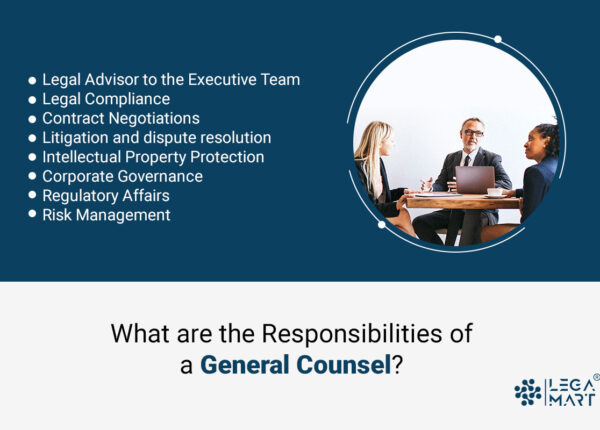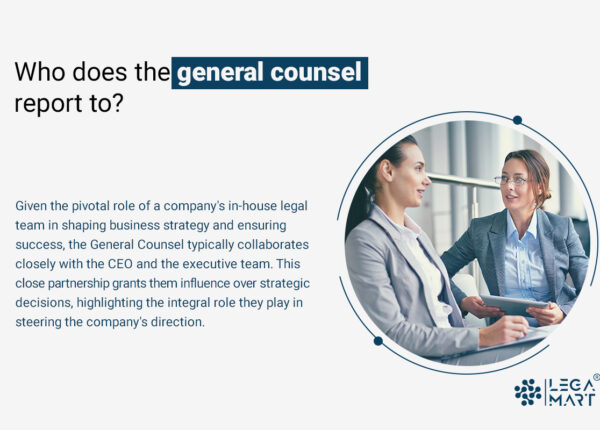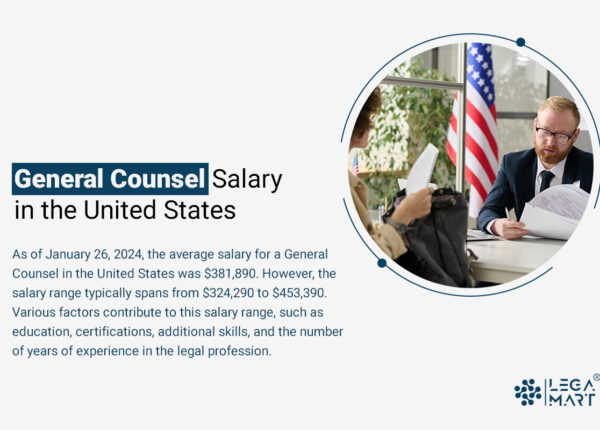According to Zippia’s data science statistics, there are over 52,634 employed general counsels, with a distribution of 38.5% women and 61.5% men. Private companies employ 33% more general counsels compared to government companies. According to the State Bar Association of San Francisco, a general counsel’s role encompasses approximately 70% transactional work, including contract reviews and negotiations, 28% compliance work, and 21% board relations.
In terms of compensation, an Audience Insight Report indicates that the average salary for General Counsels is £120,240, representing the highest average salary. Notably, these figures vary based on location, industry, and the size of the company/organization.
Introduction
As your business grows, navigating an increasingly complex legal landscape becomes inevitable. At a certain juncture, the need for a general counsel or in-house attorney becomes imperative. This legal professional assumes the pivotal role of your company’s chief legal officer, serving as the central figure for all legal matters. Whether directly engaging in legal work or overseeing external counsel assigned to specific tasks, the general counsel is the linchpin in ensuring legal compliance and safeguarding your organization’s interests.
Selecting the right general counsel is not just about legal competence; it extends to finding an individual who aligns seamlessly with your organizational culture. Crafting a comprehensive general counsel job description is therefore paramount. This document goes beyond outlining qualifications; it serves as a blueprint for delineating the responsibilities inherent in the role and articulating the values that define your company.
What is a General Counsel?
A General Counsel, often referred to as Corporate Counsel or Chief Legal Officer (CLO), holds the highest legal position within a company or government department. As a C-level executive, the General Counsel serves as the internal chief lawyer, providing comprehensive legal guidance on diverse matters such as corporate governance, contracts, regulatory compliance, intellectual property, employment law, and litigation.
This multifaceted role is integral to helping the organization navigate complex legal landscapes and make well-informed business decisions that align with legal requirements while supporting strategic objectives. Despite lacking a direct supervisor, the General Counsel may report directly to the CEO or the board of directors, underscoring their pivotal role in shaping and safeguarding the legal aspects of the organization.
Educational Qualifications to General Counsel Role in the US

To embark on a career as a General Counsel, pursuing a major in law is recommended, with 46% of U.S. General Counsels having law as their major. Alternatively, common majors for this role include political science, business, and Legal Research and Advanced Professional Studies.
Attaining the role of a General Counsel necessitates a Juris Doctor (JD) degree and successful completion of the bar examination.
The educational journey begins with pre-law undergraduate studies, allowing flexibility in choosing legal-related fields or various majors. Subsequently, passing the Law School Admission Test (LSAT) is crucial for admission to an American Bar Association-accredited law school. Upon obtaining a Juris Doctor degree, aspiring General Counsels must pass the bar examination in their intended state of legal practice.
Continuous learning is integral for General Counsels to stay abreast of evolving legal trends and statutes. Depending on state requirements, fulfilling a stipulated amount of continuing education on an annual or biannual basis may be mandatory.
Becoming a General Counsel involves accumulating experience and progressing in one’s career. Lawyers may commence their journey in private practice, transitioning to corporate lawyer roles later on. Some start with entry-level legal positions within large corporations. Regardless of the path chosen, substantial legal experience is imperative, and experience in managing other lawyers, either as a firm partner or chief counselor, enhances qualifications for general counsel job description positions.
What are the Responsibilities of a General Counsel?

A General Counsel job description entails overseeing all legal aspects of a company or organization. The general counsel’s primary duty is to offer legal guidance and support to the company’s management and board of directors, ensuring compliance with applicable laws and regulations. Within the general counsel job description roles include:
- Legal Advisor to the Executive Team:
General Counsel job description requires the provision of crucial legal counsel and guidance to the company’s leadership. This involves aiding the executive team in making informed decisions that not only align with legal requirements but also strategically minimize potential legal risks.
- Legal Compliance:
General Counsel guarantees compliance with relevant laws, covering areas such as labor, environmental, and corporate governance laws.
- Contract Negotiations:
General Counsel takes charge, overseeing and actively participating in negotiations. Their responsibilities encompass the entire contract lifecycle, from drafting and reviewing to finalizing agreements with various stakeholders such as suppliers, clients, partners, and other relevant parties. The overarching goal is to safeguard the company’s interests by ensuring that contractual obligations are clearly articulated and enforceable.
- Litigation and dispute resolution:
As part of the general counsel job description, the general counsel oversees litigation matters, including lawsuits, regulatory investigations, and arbitration proceedings, collaborating closely with external counsel to represent the company’s interests in legal disputes.
- Intellectual Property Protection:
The general counsel plays a central role in safeguarding the organization’s intellectual property within the general counsel job description, involving the proactive protection of these assets but also the rigorous enforcement of intellectual property rights when necessary.
- Corporate Governance:
General Counsels are instrumental in ensuring the organization’s compliance with corporate governance standards. This encompasses overseeing board meetings, facilitating effective shareholder communication, and shaping governance policies that align with legal frameworks.
- Regulatory Affairs:
For organizations operating in heavily regulated industries like healthcare or finance, General Counsel lawyers take on the critical responsibility of managing Regulatory Affairs within the general counsel job description, navigating complex regulatory environments and ensuring strict adherence to industry-specific rules and regulations. The General Counsel plays a key role in safeguarding the organization’s compliance, thereby mitigating regulatory risks and fostering a legal framework that aligns with the industry’s specific demand.
- Risk Management:
An integral part of the general counsel job description involves identifying potential legal risks and devising strategies to minimize or mitigate them. They provide advice on the company’s risk management policies, encompassing aspects like insurance policies and dispute resolution.
How can you become a General Counsel?
Becoming a General Counsel typically necessitates a combination of education, experience, and skills. Begin by obtaining a law degree and meeting the regulatory requirements set by the Solicitors Regulation Authority (SRA). This includes completing a bachelor’s degree, preferably in law or with a law conversion, along with the Legal Practice Course (LPC), a training contract, and the Professional Skills Course (PSC).
- Acquire Legal Experience: To qualify for a General Counsel role, accumulate several years of legal experience, often gained in a law firm or corporate legal department. Diversify your expertise across different legal areas, as this lends credibility to your legal advice and enhances your standing within the company and legal community. Industry-specific experience is valuable, providing insight into unique legal issues, regulations, and best practices.
- Combine Legal and Business Expertise: General Counsel job description positions are competitive, requiring expertise in both law and business. Cultivate your skills through training and experience at a reputable law firm or in-house department. Successful candidates demonstrate a blend of experience, strong leadership and management skills, a comprehensive understanding of law, and a robust legal network.
- Develop Leadership Skills: General Counsel job description demand strong leadership skills. Engage in leadership roles within professional organizations or volunteer in your community to foster these abilities. As a key member of the executive team, the General Counsel job description demands active contribution to decision-making, making leadership skills crucial. Effectively managing legal teams, delegating responsibilities, and motivating team members are essential components. Strong leadership enables involvement in strategic planning, identifying legal risks, developing risk management policies, and advising on matters impacting the company’s strategy. Enhance your credibility within the company and legal community to gain trust and respect, crucial elements for success in the General Counsel role.
- Gain In-House Experience: Given the role’s requirement for a profound understanding of business operations and the direct impact of legal issues on commercial decisions, ensure exposure to in-house experience. Familiarize yourself with transactional and compliance work, litigation, employment matters, and expertise in corporate, commercial, and/or regulatory law. This diverse skill set positions you for success as a General Counsel.
Who does the general counsel report to?

Given the pivotal role of a company’s in-house legal team in shaping business strategy and ensuring success, the General Counsel typically collaborates closely with the CEO and the executive team. This close partnership grants them influence over strategic decisions, highlighting the integral role they play in steering the company’s direction.
The reporting relationship of the General Counsel holds significant implications for the structure of the legal department and serves as a key indicator of the legal functions’ status within the company. This reporting chain communicates a message not only to external counsel but also to other corporate employees. Typically, the reporting dynamics of the General Counsel center on the business’s structure and size. For example, in startups, small, or medium-sized businesses, it’s common for the general counsel job description to report to the CEO, while in larger enterprises, the Chief Financial Officer (CFO), or the Chief Operating Officer.
Research consistently reveals that the General Counsel almost always reports to the top corporate officer, a pattern often aligned with their additional role as corporate secretary. This arrangement offers several advantages. Direct reporting to the highest corporate officer enhances the legal department’s influence and integration into the company’s business planning. This involvement enables the legal team to proactively address and prevent legal complications by anticipating business decisions. However, it’s crucial to strike a balance, as excessive participation of the General Counsel in business decisions may lead to ethical conflicts.
Who Reports to the General Counsel?
The issue as to who reports to the General Counsel can be complicated as it mostly depends on the size and structure of the business which may extend the general counsel’s responsibility to other teams. Normally, the direct reports to the general counsel cover the entire legal team, comprising:
- Legal Counsel: Professionals providing specialized legal advice across various domains.
- Paralegals: Support staff assisting in legal research, document preparation, and administrative tasks.
- Legal Operations Managers: Individuals overseeing the efficient functioning and coordination of legal processes.
- Contracts Managers: Experts managing the negotiation, drafting, and execution of contracts to protect the organization’s interests.
- Heads of Legal: Leaders of specific legal sub-departments or specialized areas within the legal team.
Key Skills of a General Counsel

Achieving success as a General Counsel demands a diverse skill set and capabilities, given the high-pressure nature and substantial responsibilities inherent in the role. The essential skills contributing to the effectiveness of a General Counsel in providing legal leadership, managing risks, and contributing to overall organizational success include:
- Communication Skills: Strong written and verbal communication skills to convey complex legal concepts clearly to executives, employees, and external stakeholders.
- Broad Legal Knowledge and Expertise: Strong foundational knowledge across various legal domains, encompassing corporate law, contract law, employment law, regulatory compliance, and intellectual property.
- Strategic Thinking: Capacity to think strategically and provide legal advice that aligns with the organization’s long-term goals, requiring anticipation of legal issues and proactive solution provision.
- Leadership and Management: Leadership skills for effective management of legal teams and inspiration of confidence and respect in leadership positions within organizations.
- Decision-Making: The capacity to make informed and timely decisions, often under pressure, involving the assessment of risks and benefits to guide the organization in making sound legal choices.
- Commercial Acumen: Understanding the organization’s business objectives and aligning legal strategies with overall business goals, including a keen awareness of the industry context.
- Risk Management: Proficiency in assessing and managing legal risks, involving the identification of potential challenges and the development of strategies for mitigation or resolution.
- Ethical Judgment: Unquestionable integrity and a commitment to ethical conduct, as General Counsels are relied upon for ethical guidance and ensuring organizational compliance with legal and ethical standards.
- Problem-Solving: Strong problem-solving skills to creatively address legal challenges and propose practical solutions, requiring adept analysis of complex issues.
- Regulatory Compliance: Deep knowledge of relevant laws and regulations in the organization’s industry, ensuring compliance with legal requirements.
General Counsel Salary in the United States

As of January 26, 2024, the average salary for a General Counsel in the United States was $381,890. However, the salary range typically spans from $324,290 to $453,390. Various factors contribute to this salary range, such as education, certifications, additional skills, and the number of years of experience in the legal profession. Therefore, there are several avenues to enhance your compensation as a General Counsel, including:
- Level of Education: Pursue advanced degrees to expand your knowledge and potentially qualify for promotions, thereby increasing your income potential.
- Management Experience: If you oversee junior General Counsels, this managerial experience can elevate your earning potential, reflecting the added responsibilities and leadership role within the organization.
- Change of Employer: Explore opportunities with new employers who value your skills and offer higher compensation packages.
Conclusion
In essence, General Counsel stand at the forefront of an organization’s capacity to navigate the intricate legal landscape of modern-day business. Operating as both a shield against potential legal threats and a guide facilitating informed, law-compliant decisions, they play a central role in shaping the legal trail of a company. Recognizing the multifaceted responsibilities and key qualities that make them effective is paramount for businesses seeking legal resilience and legal professionals aspiring to excel in this pivotal role. A proficient General Counsel exceeds the conventional role of a legal advisor; they emerge as strategic partners, steering the organization toward success while steadily safeguarding its legal interests. Their impact is not merely legal; it is strategic, highlighting the essential contribution of a skilled General Counsel to the overall prosperity and longevity of the organization.




